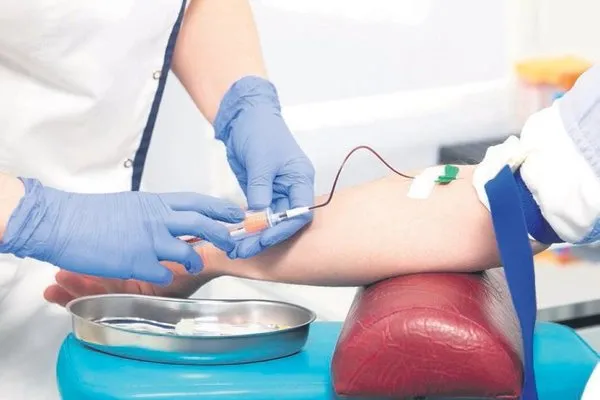
May 8 is observed as World Thalassemia Day around the globe to emphasize the importance of thalassemia and other inherited blood disorders and to raise public awareness. Within this context, the goal is to increase societal awareness and consciousness about thalassemia.
THERE ARE 4,500 THALASSEMIA PATIENTS
Prof. Dr. Yeşim Aydınok, a specialist in Pediatric Hematology at the Department of Child Health and Diseases, Ege University, stated that thalassemia—also known as "Mediterranean anemia" or "Mediterranean blood deficiency" due to its high prevalence in Mediterranean countries—is a hereditary blood disorder passed from parents to children. It causes severe anemia due to the bone marrow producing structurally defective red blood cells, but it is a preventable condition. Prof. Dr. Aydınok said, "Thalassemia is a significant public health issue in Mediterranean countries, including Turkey. Despite being a preventable disease, approximately 68,000 babies with major thalassemia are born worldwide each year. In Turkey, there are currently around 4,500 thalassemia patients."
PRE-MARRIAGE SCREENING PROGRAMS
Prof. Dr. Aydınok emphasized that thalassemia occurs in children whose parents are both carriers (have the genetic trait). She stated, "Carrier couples at risk of having a child with thalassemia can be identified through pre-marriage screenings. Since 2018, pre-marriage screening for thalassemia has been implemented in all 81 provinces of our country. Genetic counseling is provided to couples identified as being at risk."
BLOOD ECONOMY IS GROWING
The "Blood and Beyond Project Turkey Initiative Report" revealed striking data regarding the blood needs of thalassemia patients. The report highlighted the following points: "Insufficient blood supply leads to fatal outcomes, while excess blood supply results in waste of public resources. Increasing blood transfusions bring risks such as growth in the blood economy. In Turkey, voluntary blood donations meet approximately 81% of the demand. Looking at the blood economy in our country, the total cost for blood procurement, treatment, and labor amounts to $406 million. According to the 2021 Health Implementation Directive (SUT), the annual cost of blood and blood products is approximately 1.1 billion Turkish Lira, or $123.7 million. The procurement cost of one unit of blood is $41.80. According to a 10-year risk scenario for blood demand, a sudden shock in demand could increase the risk of not meeting demand. As the population ages, blood demand increases. During emergencies such as a pandemic or an earthquake, a sudden surge in demand may reduce the likelihood of supply meeting demand."
DEPENDENT ON BLOOD TRANSFUSIONS
Prof. Dr. Aydınok emphasized that thalassemia patients can sustain their lives only through regular blood transfusions of 2-3 units every 2-3 weeks throughout their lives. She said, "With adequate and safe blood transfusions, patients have the chance to achieve normal life expectancy and quality of life. Otherwise, chronic anemia shortens patients' lifespans. According to World Health Organization (WHO) data, approximately 22,500 thalassemia patients die each year due to lack of transfusions."
STEM CELL TRANSPLANTATION AND GENE THERAPY
Prof. Dr. Aydınok stated that the world is searching for solutions to the question, "How can we reduce the need for blood transfusions?" Within this context, she listed innovative treatments that could eliminate the need for blood as follows:
- One of them is stem cell transplantation. Full tissue compatibility is required, and sibling donors are needed. However, since it is a genetically inherited disease, siblings also have a possibility of having the disease. The chance of having a healthy sibling is very low. Large-scale studies are being conducted worldwide on this topic. This transplantation should ideally be performed before the age of 7-8, or at the latest by 12-14. Beyond this age, the procedure is considered high-risk.
- Research is ongoing for gene therapy. So far, one gene therapy has received regulatory approval globally. However, it is an extremely expensive technology. The cost for enabling a single patient to live without transfusions—without needing blood—is 1 million Euros.
- There are also some products still not approved for use; research on these continues.
APPLIED TO 100 PATIENTS
Prof. Dr. Aydınok, stating that after stem cell transplantation and gene therapy, a new hope lies in vaccines, said: "One of the drugs that reduce blood requirements has now been approved. For thalassemia patients who previously needed blood every three weeks, this treatment reduces their need for transfusions. This innovative drug is administered like a vaccine. However, it is not yet covered by reimbursement in our country. To date, it has been applied to 100 patients. It is also being administered at our university. Nevertheless, the need for blood remains critically important for these patients worldwide. The increasing need for blood transfusions continues to drive the growth of the global blood economy."
Source: Sabah


